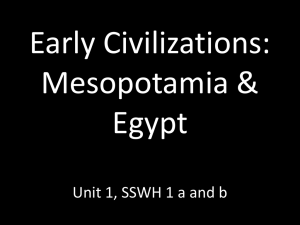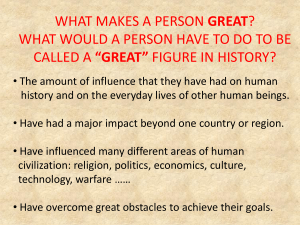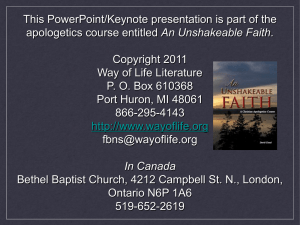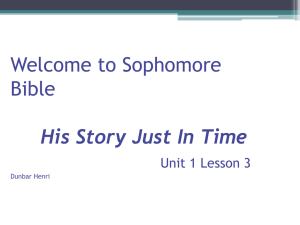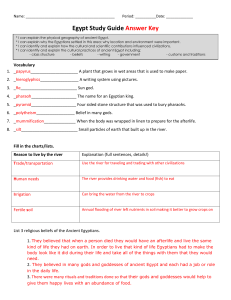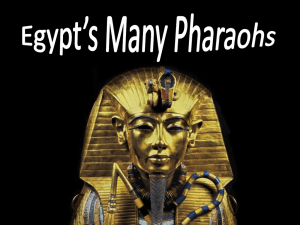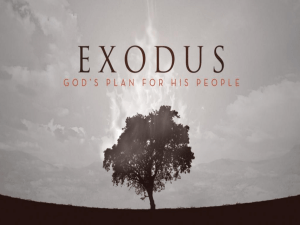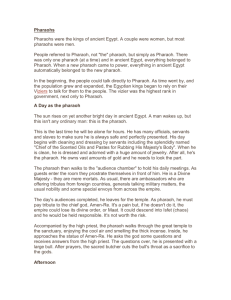Exodus 1:8-22 • The Struggle to Control God`s People
advertisement
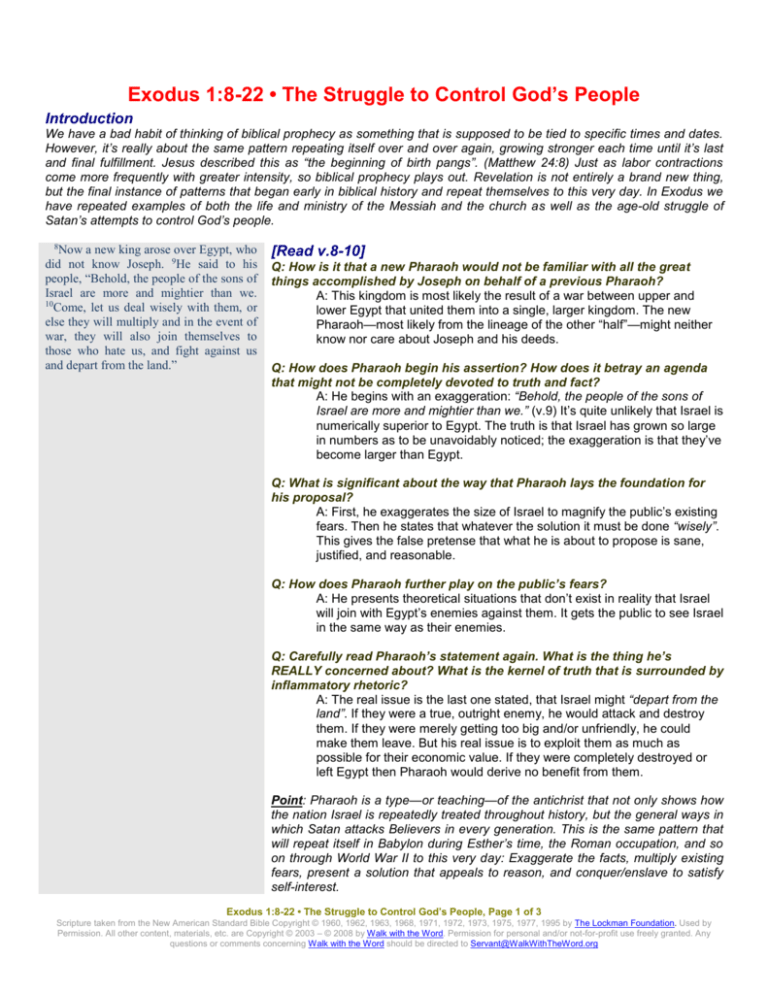
Exodus 1:8-22 • The Struggle to Control God’s People Introduction We have a bad habit of thinking of biblical prophecy as something that is supposed to be tied to specific times and dates. However, it’s really about the same pattern repeating itself over and over again, growing stronger each time until it’s last and final fulfillment. Jesus described this as “the beginning of birth pangs”. (Matthew 24:8) Just as labor contractions come more frequently with greater intensity, so biblical prophecy plays out. Revelation is not entirely a brand new thing, but the final instance of patterns that began early in biblical history and repeat themselves to this very day. In Exodus we have repeated examples of both the life and ministry of the Messiah and the church as well as the age-old struggle of Satan’s attempts to control God’s people. 8 Now a new king arose over Egypt, who did not know Joseph. 9He said to his people, “Behold, the people of the sons of Israel are more and mightier than we. 10 Come, let us deal wisely with them, or else they will multiply and in the event of war, they will also join themselves to those who hate us, and fight against us and depart from the land.” [Read v.8-10] Q: How is it that a new Pharaoh would not be familiar with all the great things accomplished by Joseph on behalf of a previous Pharaoh? A: This kingdom is most likely the result of a war between upper and lower Egypt that united them into a single, larger kingdom. The new Pharaoh—most likely from the lineage of the other “half”—might neither know nor care about Joseph and his deeds. Q: How does Pharaoh begin his assertion? How does it betray an agenda that might not be completely devoted to truth and fact? A: He begins with an exaggeration: “Behold, the people of the sons of Israel are more and mightier than we.” (v.9) It’s quite unlikely that Israel is numerically superior to Egypt. The truth is that Israel has grown so large in numbers as to be unavoidably noticed; the exaggeration is that they’ve become larger than Egypt. Q: What is significant about the way that Pharaoh lays the foundation for his proposal? A: First, he exaggerates the size of Israel to magnify the public’s existing fears. Then he states that whatever the solution it must be done “wisely”. This gives the false pretense that what he is about to propose is sane, justified, and reasonable. Q: How does Pharaoh further play on the public’s fears? A: He presents theoretical situations that don’t exist in reality that Israel will join with Egypt’s enemies against them. It gets the public to see Israel in the same way as their enemies. Q: Carefully read Pharaoh’s statement again. What is the thing he’s REALLY concerned about? What is the kernel of truth that is surrounded by inflammatory rhetoric? A: The real issue is the last one stated, that Israel might “depart from the land”. If they were a true, outright enemy, he would attack and destroy them. If they were merely getting too big and/or unfriendly, he could make them leave. But his real issue is to exploit them as much as possible for their economic value. If they were completely destroyed or left Egypt then Pharaoh would derive no benefit from them. Point: Pharaoh is a type—or teaching—of the antichrist that not only shows how the nation Israel is repeatedly treated throughout history, but the general ways in which Satan attacks Believers in every generation. This is the same pattern that will repeat itself in Babylon during Esther’s time, the Roman occupation, and so on through World War II to this very day: Exaggerate the facts, multiply existing fears, present a solution that appeals to reason, and conquer/enslave to satisfy self-interest. Exodus 1:8-22 • The Struggle to Control God’s People, Page 1 of 3 Scripture taken from the New American Standard Bible Copyright © 1960, 1962, 1963, 1968, 1971, 1972, 1973, 1975, 1977, 1995 by The Lockman Foundation. Used by Permission. All other content, materials, etc. are Copyright © 2003 – © 2008 by Walk with the Word. Permission for personal and/or not-for-profit use freely granted. Any questions or comments concerning Walk with the Word should be directed to Servant@WalkWithTheWord.org 11 So they appointed taskmasters over them to afflict them with hard labor. And they built for Pharaoh storage cities, Pithom and Raamses. 12But the more they afflicted them, the more they multiplied and the more they spread out, so that they were in dread of the sons of Israel. 13The Egyptians compelled the sons of Israel to labor rigorously; 14and they made their lives bitter with hard labor in mortar and bricks and at all kinds of labor in the field, all their labors which they rigorously imposed on them. [Read v.11-14] Q: Was this really the “wisest” and only course of action they could have taken? A: No, but it was the one that was most beneficial personally. Q: Did this solve the stated problem that unless they were dealt with wisely “they will multiply”? Why not? A: “But the more they afflicted them, the more they multiplied.” (v.12) Q: What happened to the Egyptians as a result of this course of action? A: “They were in dread of the sons of Israel.” (v.12) Point: One of the main reasons that instances of persecution of Israel and the Church become so “crazy” and out of control is the fact that it never works as intended. Since God is at work, God causes growth during such tactics. Instead of acknowledging and turning to God, the persecutors become even more irrational and zealous. The same was experienced by the Early Church wherein persecution actually resulted in both the spread of the Gospel and more radical actions by the persecutors: Saul was in hearty agreement with putting him to death. And on that day a great persecution began against the church in Jerusalem, and they were all scattered throughout the regions of Judea and Samaria, except the apostles. Some devout men buried Stephen, and made loud lamentation over him. But Saul began ravaging the church, entering house after house, and dragging off men and women, he would put them in prison. Acts 8:1-3 15 Then the king of Egypt spoke to the Hebrew midwives, one of whom was named Shiphrah and the other was named Puah; 16and he said, “When you are helping the Hebrew women to give birth and see them upon the birthstool, if it is a son, then you shall put him to death; but if it is a daughter, then she shall live.” 17 But the midwives feared God, and did not do as the king of Egypt had commanded them, but let the boys live. 18 So the king of Egypt called for the midwives and said to them, “Why have you done this thing, and let the boys live?” 19 The midwives said to Pharaoh, “Because the Hebrew women are not as the Egyptian women; for they are vigorous and give birth before the midwife can get to them.” 20 So God was good to the midwives, and the people multiplied, and became very mighty. 21Because the midwives feared God, He established households for them. [Read v.15-21] Q: Stand back and look at Pharaoh’s efforts to this point. How would you characterize the two prongs of his assault thus far? A: He first attacked Israel from without by publicly subjugating them, then attacked them from within by attempting to enlist the support of the midwives. Q: What is significant about the names of the midwives? A: “Shiphrah” means “beauty” and “Puah” means “splendid”. It’s an indication that Pharaoh’s tactic is to invoke evil through something that is both close to Israel and pleasing in appearance. He’s attempting something that he’s still trying to keep at least partially hidden from full view. Point: Every generation of Believer—and particularly the last generation of the End Times—faces spiritual attack both from forces outside the church and within. Q: How were Pharaoh’s plans thwarted? A: It was thwarted by people that feared God more than man. The fact that it came through the midwives is a teaching of how God’s salvation is at work even in the midst of severe persecution, as well as the role of those who take up God’s side on behalf of Israel, both at that time and in the Last Days to come. God comes to ANYONE who chooses Him over the world. Exodus 1:8-22 • The Struggle to Control God’s People, Page 2 of 3 Scripture taken from the New American Standard Bible Copyright © 1960, 1962, 1963, 1968, 1971, 1972, 1973, 1975, 1977, 1995 by The Lockman Foundation. Used by Permission. All other content, materials, etc. are Copyright © 2003 – © 2008 by Walk with the Word. Permission for personal and/or not-for-profit use freely granted. Any questions or comments concerning Walk with the Word should be directed to Servant@WalkWithTheWord.org Q: What is the result of choosing God over the world/Satan’s ways? A: Being established by God. It’s a picture of eternal life even in the shadow of one’s earthly existence being threatened with termination. Q: Was Pharaoh’s course of action successful? A: No, because “the people multiplied and became very mighty”. (v.20) In spite of his original warnings that something must be done “or else they will multiply” (v.10), Pharaoh’s efforts have had the exact opposite effect than intended. 22 Then Pharaoh commanded all his people, saying, “Every son who is born you are to cast into the Nile, and every daughter you are to keep alive.” [Read v.22] 23 Now it came about in the course of those many days that the king of Egypt died. And the sons of Israel sighed because of the bondage, and they cried out; and their cry for help because of their bondage rose up to God. 24So God heard their groaning; and God remembered His covenant with Abraham, Isaac, and Jacob. 25 God saw the sons of Israel, and God took notice of them. [Read Exodus 2:23-25] Q: How is Pharaoh’s command different here than that to the midwives? A: The command to the midwives was an “indirect” command wherein he attempted to get a third party to carry out his orders; this command is a “direct” command from him personally. The persecution of Israel has escalated from being “discreet” or mostly hidden from everyone’s view to an open public policy. Q: What was the net effect of Pharaoh’s policies on Israel’s spiritual life? A: It caused them to turn to God. Q: What is the key difference between Pharaoh’s actions and those of Israel? A: Whereas Pharaoh sought only to satisfy himself and therefore every action was self-directed, Israel turned from self to God to become Goddirected. Q: What might we infer from this passage as to when and how God acts? 1. One of the main purposes of such events is to identify those who are willing to become God-directed rather than self-directed. 2. The people had to first return to and acknowledge their need for God. 3. Although God immediately heard and saw, He implemented a solution that would take further time before it arrived in the form of Moses and Aaron. Everything comes according to His ways and timing. Overall Application What are examples of worldly—even “religious”—authorities that have sounded reasonable but, in reality, been at odds with the kingdom of God? How should we personally deal with them? How do we identify the different spiritual and worldly attacks both from outside and inside the church? How should we respond? Do you see the opportunities for spreading the Gospel even in the most “crazy” circumstances? Ever notice how Paul won others to Christ even while in jail or under arrest? Just because factors make things difficult, does that mean we’re not to live and preach the Gospel? Discuss cultural and social changes in our present climate that are similar to the three, escalating methods of attack employed by Pharaoh. How are these things an indication of the church being persecuted? Of these being the Last Days? Exodus 1:8-22 • The Struggle to Control God’s People, Page 3 of 3 Scripture taken from the New American Standard Bible Copyright © 1960, 1962, 1963, 1968, 1971, 1972, 1973, 1975, 1977, 1995 by The Lockman Foundation. Used by Permission. All other content, materials, etc. are Copyright © 2003 – © 2008 by Walk with the Word. Permission for personal and/or not-for-profit use freely granted. Any questions or comments concerning Walk with the Word should be directed to Servant@WalkWithTheWord.org
